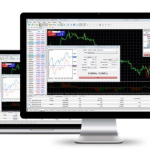Forex trading is often described as a mix of analysis, strategy, and psychology. While technical knowledge and market understanding are crucial, emotional discipline plays an equally significant role in achieving long-term success. Controlling emotional trading is not just about staying calm; it is about developing a mindset that supports rational decision-making and reduces impulsive actions.
When trading in an unpredictable market, forex trading education such as fear and greed can significantly influence decisions. For example, a trader may be tempted to hold onto a losing position due to the fear of accepting a loss, or they may take unnecessary risks fueled by the euphoric high of past successes. These emotional reactions often lead to poor decisions and financial losses.
One of the key benefits of forex trading education is that it prepares traders to approach the market with a level-headed attitude. By learning the psychological aspects of trading, individuals can build the resilience needed to stick to a trading plan and avoid being ruled by short-term emotions. Emotional control helps traders focus on long-term goals rather than reacting to every market shift.
Forex trading education also introduces powerful tools such as stop-loss and take-profit settings. Utilizing these features can help traders stick to predefined risk parameters, reducing the anxiety of monitoring every market movement. Additionally, educational resources teach how to manage risk effectively, offering strategies to protect capital even during volatile periods.
Self-awareness is another crucial aspect covered in many trading courses. Recognizing personal biases and emotional triggers allows traders to identify when emotions are impacting their decisions. Over time, this self-awareness fosters improved discipline and better market outcomes.
Practicing good habits in forex trading leads to consistent growth, both financially and mentally. A well-trained trader is not only equipped with market knowledge but also with the psychological tools to remain unaffected by the highs and lows of trading. Education is an investment in the skills needed to turn market challenges into lifelong opportunities.
